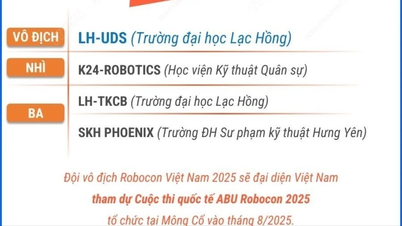IPv4, the protocol that was born with the internet since the early days, has provided more than 4 billion addresses but officially exhausted since 2021. To overcome this, IPv6 was designed with a nearly infinite address space, while providing high performance and lower costs. 2024 marks a notable event when the global IPv4 routing graph decreased for the first time in May, marking a strong increase in IPv6-based connections.
At the Internet Day 2024 event held on November 27 in Hanoi , Mr. Nguyen Hong Thang, Director of Vietnam Internet Center (VNNIC) shared the plan to convert the entire internet system in Vietnam to IPv6 protocol from 2030 to catch up with the global trend, when IPv4 is no longer able to meet the increasing demand.

Mr. Nguyen Hong Thang, Director of VNNIC, commented that the general trend of the world is to completely switch to IPv6.
In Vietnam, IPv6 began to be deployed in 2013, alongside IPv4 - a protocol that has been present since 1997 when the internet appeared in Vietnam. To date, the IPv6 usage rate nationwide has reached 65.35%, far exceeding the world average of 40%, putting Vietnam in the top 7 countries with the highest IPv6 deployment rate, up two places compared to last year.
The general trend of the world will shift from IPv4 to IPv6. In Vietnam, the plan is that from 2027, Internet service providers (ISPs) will prioritize deploying IPv6 only, before completely turning off IPv4 in 2030. This is not only a technical solution, but also brings many economic and technological values, which can save millions of USD.
IPv6 also consumes less energy, which helps reduce operating costs and contributes to the development of a “green” internet. In addition, this protocol also better meets the requirements of new technologies such as AI, 5G and cloud computing.
IPv6 is also a key factor for the development of the Internet of Things (IoT). As the number of connected devices increases rapidly, IPv6 with its huge capacity will ensure the connection of millions of devices at the same time. The goal is that by 2030, each Vietnamese person will have an average of four IoT connections, creating a foundation for smart applications and edge computing technology.
Vietnam’s plan to turn off IPv4 and completely switch to IPv6 not only solves the problem of address space but also marks a strategic step in preparing for a comprehensive digital future. This is an opportunity for Vietnam to consolidate its position on the world technology map, while building a foundation for sustainable and modern digital economic development.
Source: https://thanhnien.vn/viet-nam-chuyen-dan-internet-sang-ipv6-tat-ipv4-tu-nam-2030-185241127224251089.htm



































![[Photo] Prime Minister Pham Minh Chinh receives leaders of several Swedish corporations](https://vphoto.vietnam.vn/thumb/1200x675/vietnam/resource/IMAGE/2025/6/14/4437981cf1264434a949b4772f9432b6)





































































Comment (0)